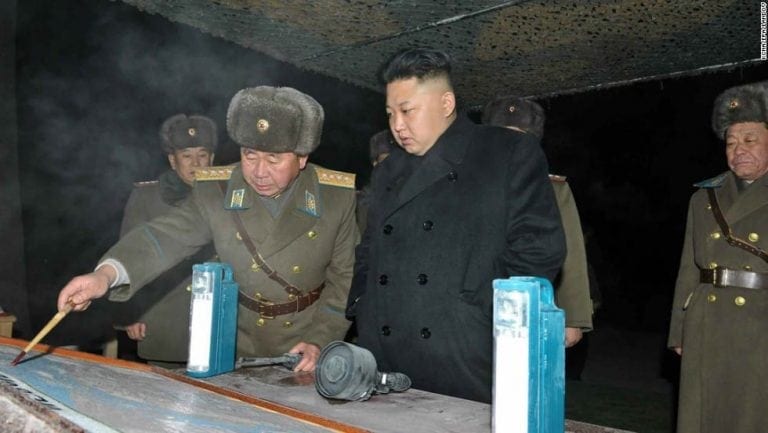Lendman on China’s Flawed Reasoning Behind New North Korea Sanctions & other topics
China’s Flawed Reasoning Behind New North Korea Sanctions
Sanctions don’t work. They’re counterproductive and ineffective. They’re imposed for punitive reasons, yet accomplish nothing other than harming ordinary people in targeted nations.

A picture released by the North Korean Central News Agency (KCNA) on 23 January 2014 shows North Korean leader Kim Jong-un (C) inspecting a North Korean Army unit conducting a winter drill. KCNA reported it without elaborating on the timing of the visit or the venue. EPA/KCNA /LANDOV
US sanctions on Russia failed, its economy growing again this year, expecting greater growth in 2018. Many years of Iran and North Korea sanctions did nothing to change their policies, just the opposite. Both countries became more determined to defend themselves against feared US aggression.
Nuclear weapons aside which Iran lacks, its military matches or exceeds the capability of other Middle East nations. Nuclear armed North Korea’s military is formidable. Both nations face the risk of US aggression. In Iran’s case, Israel poses a major threat. For both countries, military power is essential for self-defense, neither nation an aggressor. Their histories proves it, providing clear evidence neither country threatens any others. They’re threatened, not the other way around, requiring a strong defense. North Korea decided to include nuclear weapons in its arsenal, believing they’re the best way to deter US aggression.
Iran advocates a nuclear-free region, a world free from these weapons of mass destruction. It developed its military with powerful conventional weapons – never attacking another nation in centuries, threatening none now.
Piling on more sanctions against these or other countries makes them more determined to enhance their defense capabilities. Anything less would be irresponsible.
The problem of their military capabilities lies in Washington, not their seats of government.
If America’s rage for global dominance didn’t exist, nor Israel’s quest for regional hegemony, North Korea and Iran wouldn’t have gone all-out to develop potent military capabilities.
In going along with Washington’s demand for tougher Security Council sanctions on North Korea, along with earlier rounds, Russia and China acted irresponsibly.
They bowed to America’s imperial will, failing to reject it, imposing enormous harm on ordinary North Koreans, accomplishing nothing else.
According to China’s Global Times (GT), representing Beijing’s views, its government “object(ed) to a maritime military blockade against Pyongyang that might trigger conflict.”
Fact: By banning most DPRK imports, including food and other essentials, China and Russia effectively agreed to a partial blockade – a shameful act by both countries, siding with an imperial aggressor, opposing the aggrieved nation.
GT: New sanctions show “the determination of major powers to prevent the country conducting further tests.”
Fact: Each round of sanctions encouraged Pyongyang to continue developing its nuclear and ballistic missile capabilities, nothing to curtail them.
GT: “The international community is hoping new sanctions stop Pyongyang conducting nuclear activities and make Washington more patient to break the stalemate.”
Fact: Chances for accomplishing these objectives are virtually nil. Russia and China know it – why pretend otherwise!
GT: “The US military threat does not sound like a mere verbal menace anymore. Now is undoubtedly the most insecure time for Pyongyang since the 1950s.”
Fact: Indeed so! Sanctions achieve nothing toward reducing the threat North Korea faces.
Fact: America is a notorious bully, a threat to world peace. The only language it understands is force, targeting nations it can easily overwhelm.
Fact: Combined, Russian and Chinese military capabilities match Washington’s. Instead of going along with its imperial designs, including sanctions on North Korea, both countries should challenge the Trump administration – short of risking war.
Fact: When confronted by strength matching its own, bullies usually back off. Failing to do so makes matters worse.
In the case of North Korea, it advances things closer to war on the peninsula, the risk greater after the latest round of sanctions, not the other way around.
GT: China is “sympathetic toward North Korean people that suffer the hardships. We hope the sanctions only target its nuclear development and missile activities. We do not want to hurt people’s livelihoods or impair the stability of the” nation.
Fact: That’s precisely what multiple rounds of sanctions did. Since first imposed on its nuclear program in 2006, it steadily advanced, far more capable now than then, along with ballistic missiles able to travel longer distances.
A nuclear-free world would be ideal – not as long as America maintains an arsenal, its capability Trump and other US hawks intend enhancing.
Perhaps they’ll be used against North Korea, Iran and/or another targeted country ahead.
The DPRK wants peace, a formal end to the 1950s conflict, recognition of its sovereign rights, and oppressive sanctions lifted.
America wants endless wars of aggression, seeking subservience of all nations to its will.
Unless challenged, global war may be inevitable – China and Russia the only nations able to do it effectively.
Appeasing hegemons doesn’t work. Confronting them responsibly may be the only way “to save succeeding generations from the scourge of war, which twice in our lifetime has brought untold sorrow to mankind” – as stated by the UN Charter’s Preamble.
A Final Comment
[dropcap]I[/dropcap]n response to the latest SC sanctions, Pyongyang’s Korean Central News Agency (KCNA) said the following:
“We will further consolidate our self-defensive nuclear deterrence aimed at eradicating the US nuclear threats and establishing the balance of force with it.”
DPRK nuclear weapons aim to protect the nation against “the blackmail of American imperialists.”
“The US should not forget that the Democratic People’s Republic of Korea has rapidly emerged as a strategic state capable of posing a substantial nuclear threat to the US mainland.”
Likely not yet, perhaps soon, and the DPRK’s message is clear. It intends pursuing its nuclear and ballistic missile capabilities as long as it fears possible US aggression.
No matter how severe, sanctions won’t stop it from advancing its ability to defend the nation.
WaPo Russophobia
[dropcap]R[/dropcap]epublicans, undemocratic Dems, and media scoundrels criticize Russia for its sovereign independence, its opposition to America’s imperial agenda, its support for multi-world polarity – inventing reasons to vilify the country and its leadership.
The neocon/CIA-connected Washington Post is notoriously Russophobic. It latest tirade irresponsibly claims “Russian submarines are prowling around vital undersea cables…making NATO nervous,” adding:
Activity is “dramatically stepped up,” claiming what’s nonexistent is “part of a more aggressive naval posture…giv(ing) the Kremlin the power to sever or tap into vital data lines…”
Fact: Russia is a preeminent world peace leader, threatening no other nations, at war with none.
Fact: Its geopolitical agenda is polar opposite America’s, waging endless wars of aggression, threatening all nations not subservient to its will, deploring diplomacy, confrontation and belligerence its favored strategies.
Why would Russia want to threaten the “undersea infrastructure of NATO nations? What benefit could it gain? Like virtually all other Western accusations against the Kremlin, this one is baseless, the latest example of irresponsible Russia bashing. According to WaPo, NATO intends reestablishing a command post to secure the North Atlantic. It’s increasing anti-submarine warfare capabilities, along with developing advanced submarine detection aircraft.
Why when no threats exist, just invented ones? Claiming them is an old trick to justify unjustifiably greater military spending, diverting more of the nation’s resources for militarism and belligerence, reducing amounts for vital homeland needs, including an excuse to further erode social justice programs.
WaPo: “Britain’s top military commander…warned that Russia could imperil the cables that form the backbone of the modern global economy.”
What utter rubbish! Russia is part of the global economy. Why would it harm its own interests?
Britain’s air chief marshal Stuart Peach warned if cables are cut or disrupted, (it) would immediately and potentially catastrophically affect both our economy and other ways of living…”
They’re in no danger of being disrupted or cut by Russia – maybe jeopardized by Washington and Britain to falsely blame the Kremlin for something it would never do – a possible joint false flag they may be planning, or something as nefarious.
WaPo added more baseless accusations, claiming Moscow threatens NATO aircraft and troops.
US-dominated NATO expanded close to Russia’s borders, breaking then-Secretary of State James Baker’s “iron-clad” pledge to Mikhail Gorbachev not to expand the alliance “one inch eastward.”
Today, US-led NATO forces surround Russia, posing a major threat to its security, not the other way around.
Moscow threatens no other nations, seeks mutual cooperation with them all worldwide, and is committed to global peace and stability. Its record speaks for itself, dispelling Big Lies about its agenda.
America and its rogue allies pursue endless wars of aggression – posing humanity’s greatest threat.
WaPo is a CIA house organ. Its geopolitical reporting lacks credibility. Its Russia bashing goes on endlessly.
Its support for US imperial wars of aggression is longstanding, along with its disdain for world peace and stability.
 STEPHEN LENDMAN was born in 1934 in Boston, MA. In 1956, he received a BA from Harvard University. Two years of US Army service followed, then an MBA from the Wharton School at the University of Pennsylvania in 1960. After working seven years as a marketing research analyst, he joined the Lendman Group family business in 1967. He remained there until retiring at year end 1999. Writing on major world and national issues began in summer 2005. In early 2007, radio hosting followed. Lendman now hosts the Progressive Radio News Hour on the Progressive Radio Network three times weekly. Distinguished guests are featured. Listen live or archived. Major world and national issues are discussed. Lendman is a 2008 Project Censored winner and 2011 Mexican Journalists Club international journalism award recipient. His new site is at http://stephenlendman.org
STEPHEN LENDMAN was born in 1934 in Boston, MA. In 1956, he received a BA from Harvard University. Two years of US Army service followed, then an MBA from the Wharton School at the University of Pennsylvania in 1960. After working seven years as a marketing research analyst, he joined the Lendman Group family business in 1967. He remained there until retiring at year end 1999. Writing on major world and national issues began in summer 2005. In early 2007, radio hosting followed. Lendman now hosts the Progressive Radio News Hour on the Progressive Radio Network three times weekly. Distinguished guests are featured. Listen live or archived. Major world and national issues are discussed. Lendman is a 2008 Project Censored winner and 2011 Mexican Journalists Club international journalism award recipient. His new site is at http://stephenlendman.org


